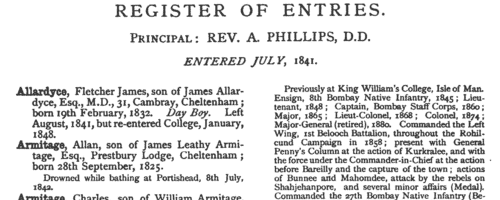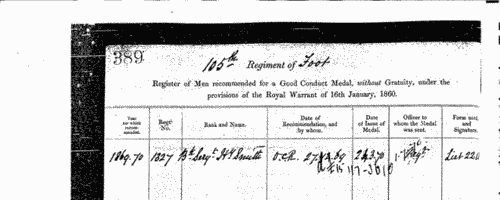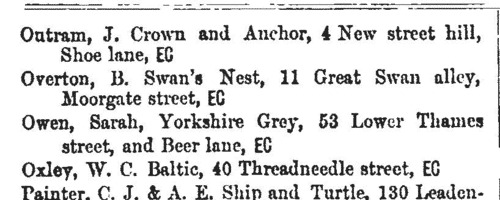Add this eBook to your basket to receive access to all 122 records. Our indexes include entries for the spelling carlyon. In the period you have requested, we have the following 122 records (displaying 81 to 90): These sample scans are from the original record. You will get scans of the full pages or articles where the surname you searched for has been found. Your web browser may prevent the sample windows from opening; in this case please change your browser settings to allow pop-up windows from this site. Boys entering Cheltenham College
(1864)
Cheltenham College 'was founded in order to provide for the sons of gentlemen a Classical, Mathematical, and General Education of the highest order, on moderate terms, in strict conformity with the principles and doctrines of the Church of England.'
Andrew Alexander Hunter, the college registrar, compiled the first edition of the College Register in four parts from 1883 to 1886: these merely listed the boys by term of entry, with their dates of birth and names and addresses of their fathers. Circulars were also sent out to all Old Cheltonians whose addresses were known, requesting additional details. On the basis of the returns from these and Hunter's further researches, this much fuller register was published in 1890.
The information after each boy's name is given (where known and applicable) in this format: father's full name and address as of the time the boy entered the college; class and department on entering the college (classes being number from 1 downwards, and these again divided into A and B, some into C and D, others into P (Principal's side) and V. P. (Vice-Principal's side) - 1A was the highest class in each department: besides this, certain others were called Addiscombe, Woolwich, Civil, Direct, Line, Sandhurst, Naval, Special, Preparatory, Latin, and India Civil) and the same on leaving, name of Boarding House (or 'Day Boy'), scholastic and athletic honours attained at the college, and subsequent career (including date and place of death, or present address in 1890, if known). | Sample scan, click to enlarge

| Boys entering Elizabeth College, Guernsey
(1864)
Elizabeth College, Guernsey, was founded in 1563 and rechartered in 1825. Charles James Durand, Kentish Brock and Edward Charles Ozanne compiled this edition of the college register, published in 1898. The names are arranged by term of entering the school, with a sequential number, surname and christian names in bold: then place and date of birth, father's name or reference to a brother previously at the school; and year of leaving. Beneath that, in smaller type, the compilers put what they could glean about the boy's subsequent career. | Sample scan, click to enlarge

|  Outstanding soldiers of the Scots Guards
(1860-1870) Outstanding soldiers of the Scots Guards
(1860-1870)
The Scots Fusiler Guards regiment was in two battalions. The 1st battalion returned from the Crimea in 1856. The second battalion returned from Portugal in 1828. Each year just a handful of outstanding soldiers of the regiment were chosen for good conduct medals and gratuities: these are listed here. There were two lists, one for men recommended for the Good Conduct Medal without a gratuity, and one for gratuities - £5 to a private, £10 to a corporal, and £15 to a serjeant. Both lists are indexed here, and each gives rank, name, regimental number, date of recommendation and date of issue. (The sample scan is from the 105th foot) | Sample scan, click to enlarge

|  Recipients of the New Zealand War Medal
(1861-1871) Recipients of the New Zealand War Medal
(1861-1871)
The New Zealand War Medal was awarded for service New Zealand campaign 1861 to 1866: this further progress report issued by the medal committee in Wellington 2 September 1871 lists officers and men of the colonial forces who had made application for the medal for services rendered prior to 31 December 1866, and whose claims had been admitted by the commissioners; as well as those whose claims had been rejected (with the reason); and also those officers and men included in the rolls formed by the late commissioners whose names also appear in the lists of those granted medals by the Imperial Government. | Sample scan, click to enlarge

| Inhabitants of Ceylon (1871)
'The General Directory: of European Residents; Principal Public Servants; and Inhabitants, generally, of Respectable Standing:- including the Secretaries and Principal Clerks in the Various Public and Private Offices; and the Principal Native Headmen, Traders, &c., &c.' corrected up to 16 October 1871, published in A. M. Ferguson's Ceylon Directory.
| Sample scan, click to enlarge

| Mathematics students at Cambridge University
(1871)
Tripos lists or examination results for the year, arranged by class (Wranglers, Senior Optimes and Junior Optimes), and within each class in order of score in the examination (the names of candidates with equal scores are bracketed together, with the word 'AEq.'). Each student's surname and college is given: this list was printed in 1890, and was annotated with asterisks to show which students had subsequently become fellows of the university; and with footnotes showing those who became headmasters, &c., elsewhere. Winners of Dr Smith's Mathematical Prizes are marked (1) senior, (2) for junior. The Greek letter alpha is affixed to the names of those students who had gained first class results in the Classical Tripos; beta to those entered in the second class; and gamma to those entered in the third class. These lists are particularly useful in identifying for an individual the fellow-students who will have attended lectures with him; and, where from the college, are likely to have been even more closely associated by having been under the same supervisor. (The sample scan is from the start of the Mathematics Tripos list for 1770) | Sample scan, click to enlarge

| Innkeepers and Publicans in London north of the Thames
(1874)
Henry Downes Miles compiled this London and Suburban Licensed Victuallers', Hotel and Tavern Keepers' Directory, which also had sections listings brewers, maltsters, hop factors, distillers and rectifiers of the United Kingdom. | Sample scan, click to enlarge

| Private Residents of Birmingham and Suburbs
(1878)
The Post Office Directory of Birmingham with its Suburbs, edited by E. R. Kelly, and published in 1878, has two main alphabetical lists - Court and Commercial. The suburbs included are Aston, Bickenhill Park, Birchfield End, Castle Bromwich, Erdington, Saltley (with Washwood Heath), Ward End (including Little Bromwich) and Witton, in Warwickshire; Handsworth (with Soho), Harborne, Perry Barr and Smethwick, in Staffordshire; and King's Heath, King's Norton, Moseley, Northfield, Selly Oak and Yardley (including Hall Green and Stechford) in Worcestershire. The Court section, indexed here, lists nobility, gentry, clergy, and private residents in general. | Sample scan, click to enlarge

| Elementary Teachers in South Devon and East Cornwall
(1880)
The National Union of Elementary Teachers, established in 1870, brought together members of the profession throughout England and Wales, organized in local Teachers' Associations. Lists of members of the associations were printed in the annual reports. Each association's officers are listed first, then the ordinary members. Surnames are given, Mr/Mrs/Miss, initial(s), and the name of the school - B. S., British School; Bd. S., Board School; Congl. S., Congregational School; End. S., Endowed School; Gr. S., Grammar School; N. S., National School; Par. S., Parochial School; Pres. S., Presbyterian School; R. C. S., Roman Catholic School; Undl. S., Undenominational School; W. S., Wesleyan School. | Sample scan, click to enlarge

| Residents of Ceylon (1880)
The General Directory of Ceylon lists residents alphabetically by surname, with initials, occupation and address. It covers 'European residents, principal public servants, professional classes, and inhabitants, generally, of respectable standing'
| Sample scan, click to enlarge

|
Research your ancestry, family history, genealogy and one-name study by direct access to original records and archives indexed by surname.
|












